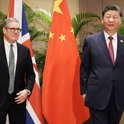You have to feel for Keir Starmer. Three months ago he became leader of a party which had just plunged to its worst defeat in 85 years, amidst the worst pandemic in a century and a country more divided than at any point in living memory. So, coming up to 100 days in, how is he doing?
On the basis of polling, very well. An Opinium poll at the end of June found that 37 percent of people thought Starmer would make the better prime minister, compared to 35 percent for Boris Johnson. This is the first time a Labour leader has outpolled his Conservative opponent since 2007. And although the Tories are still outpolling Labour by between four and seven points, in early April that figure was 24 points. By any measure, such a rapid turnaround represents an achievement.
When you consider the context this feels even more impressive. You could hardly imagine more difficult circumstances for becoming the opposition leader. At a time of national crisis, the public instinctively rallies behind the government, and of course we all want our leaders to succeed, because in this case not succeeding means that people unnecessarily die. Starmer knew that it would have been a dangerous look to mount strident attacks, which many would have painted as gratuitous. As if to make his introduction even harder, Johnson was admitted to hospital the day after Starmer became leader. For weeks afterwards, the prime minister was politically untouchable, despite the egregious errors which had landed the UK with Europe’s worst death toll.
Now, things feel different. In the last six weeks the government has, on occasion, looked close to falling apart. The scandals over Dominic Cummings, personal protective equipment and care homes have made a majority of 80 look genuinely fragile. Johnson, in particular, has made so many unforced errors that few commentators are certain he will still be in office at the next election. As the worst recession in 300 years starts to hit, and unemployment skyrockets, the news for the government will only get tougher.
Starmer therefore walks a tightrope. On the one hand he must do everything to encourage the government and prevent the most calamitous effects of the virus. On the other, he must prepare for those consequences and capitalise politically. But as the government continues to expose itself, it becomes easier to attack it.
The Labour leader’s performances at Prime Minister’s Questions illustrate that trajectory. At first, his appearances were calm, polite and even, at times, congratulatory. Like a supportive teacher, he seemed keen to praise the government’s successes while holding up individual decisions for scrutiny. That stance has given way to a more robust and combative approach. There were the sharp takedowns over the NHS migrant surcharge, the failure of the contact-tracing app and deaths in the care sector. He has not been afraid to call Johnson out for his inaccuracies or even to insist (to no avail) that he return to the House to correct the record. On Wednesday he demanded an apology for the prime minister’s scarcely believable inculpation of care homes for spreading the virus.
The word most commonly used to describe these appearances is “forensic.” Starmer has been anxious to cultivate a quiet moral authority. He wants voters, and journalists, to see him as cautious, methodical and above all, competent.
But that carries profound risks. In the space of just three months, and before he has introduced a single major policy, Starmer has overseen a profound rift with the Labour left. The dismissal of Rebecca Long-Bailey, whatever its rights or wrongs, felt like a moment of severance. Certainly, some on the left wish him outright failure, just as some on the right sought for Corbyn, and it may have been useful for Starmer to mark clear distance from the previous era. And yet he must remember that the mainstream left also put him in power, and will expect him to honour his commitments. He may recall, too, that divided parties don’t usually win elections.
There is also the continual danger of finding himself on the wrong side of the culture wars. Although Starmer has avoided the iceberg of the Brexit trade talks—for now—other battles loom. On Black Lives Matter, in particular, he has been found wanting. The interview where he rejected defunding the police was significant. In his haste to align himself with mainstream opinion, he risked alienating a section of the population, and his party, who had experienced police brutality and sought a nuanced discussion about community-led approaches. On trans rights, too, activists have accused him of adopting a “both-sides” approach which leaves them vulnerable and exposed. The point is that Starmer is not a firebrand campaigner but a wary pragmatist. He wants to stand up for marginalised communities but also fears a media that will misinterpret his position and potentially alienate him from centrist opinion. He aims to pick his battles, and if he cannot pick them, then time them. But the danger is that caution comes to be seen as cowardice, and triangulation a lack of political principle. These battles will come, and come often.
To the surprise of many, the right-wing press has not launched a campaign against him—yet. Perhaps they don’t see him as a credible threat. Perhaps they are genuinely intrigued or even open to him. And it may be that they are using positive coverage of Starmer as a warning shot to the Conservatives. For the time being it seems that newspapers will, if not outwardly endorse him, then not entirely reject him either. After the dismissal of Long-Bailey, George Osborne declared that “this guy is very serious about getting into Downing Street.”
The key point about Starmer is that we still don’t know exactly what he believes or where he plans to take his party. The virus is all-consuming and now is not the time for great policy initiatives. But eventually the public will need to see not simply what he is against but what he is for. The last 100 days have been a baptism of fire, and on the whole he has risen to the occasion. But even while he outperforms the prime minister, the tightrope of drawing the support of both conservatives and progressives is narrow—and he has only just started to walk it.
Keir Starmer’s first 100 days
The Labour leader will not succeed on the basis of wary pragmatism alone
July 09, 2020

Photo: Aaron Chown/PA Wire/PA Images












